#Scrape Liquor Delivery App Data
Explore tagged Tumblr posts
Text
How to Scrape Liquor Delivery Mobile App Data for Market Insights?
Mobile App Scraping offers Liquor Delivery Mobile App Data Scraping Services to extract data from popular Liquor Delivery Mobile Apps such as Swiggy, Hipbar, Zomato, Bottle Rover, Jhoom, BevQ, Living Liquidz, etc.
Know more >>
#Scrape Liquor Delivery App Data#Liquor Delivery App Data Scraping#Liquor Delivery App Data Scraper#Extract Liquor Delivery App Data#Liquor Delivery App Data Extraction
0 notes
Text
Alcohol Delivery App Data Scraping - Liquor Apps Extraction
Extract liquor app data in the USA, UK, UAE, Australia, Germany, and Spain for valuable insights using our efficient alcohol delivery app data scraping service.
know more:
0 notes
Text
Empower the Surge of Online Alcohol Retail in the UK by Web Scraping Liquor Data

The Alcohol eCommerce sector has experienced rapid expansion, a trend accentuated by the pandemic. Post-pandemic, factors like convenience, safety, and home delivery gained prominence, propelling alcohol sales through eCommerce. In the UK, Kantar noted a £261 million surge in rising sales, with online and convenience stores emerging as the key beneficiaries. Intriguingly, the IWSR Drinks Market Analysis Report 2022 highlighted a global preference for websites over apps when purchasing alcohol online, except in China and Brazil. Notably, in the UK, major online alcohol purchases occur via retailer websites, not apps.

Research Approach
Our research was conducted through liqour data scraping, spanning February 2022 to June 2022. The focus of our study encompassed two prominent grocery retailers, namely Tesco and Ocado, along with three noteworthy grocery apps, namely Gorillas, Weezy, and Getir. The specific category under scrutiny throughout our analysis was alcohol.
Identifying The Alcohol Price Leader
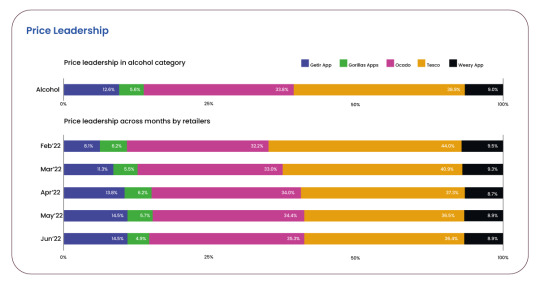
Tesco's Leadership In Alcohol Pricing
Throughout February to June 2022, Tesco consistently established itself as the front-runner in price leadership within the Alcohol category. Leveraging e-commerce data scraping, Tesco secured the lowest prices for 38.9% of its products. Ocado followed closely with 33.8%, while Gorillas exhibited the most minor dominance, leading in price for only 5.6% of its alcohol offerings.
Nonetheless, Tesco's grip on price leadership experienced a gradual erosion over the months. Commencing in February,e-commerce data scraping revealed Tesco's hold on the lowest price for 44% of its products, which tapered to just over 36% by June. Conversely, Ocado depicted an inverse trajectory—starting at a 32% price leadership in February, climbing to 35.3% by June.
An intriguing contender, illuminated through e-commerce data scraping, was Getir. Commencing with a modest 8.2% price leadership for its products in February, Getir's proportion progressively expanded, culminating at 14.5% in June.
Retailers Employing Discounts To Bolster Alcohol Sales
Leveraging discounts using liquor product data collection proves to be an effective strategy to attract consumers impacted by inflation. Through loyalty card discounts, reward vouchers, and various promotional tactics, retailers enhance the allure of their products, rendering them more competitive and appealing to customers. Maintaining competitiveness necessitates retailers' awareness of their rivals' discount offerings. Moreover, price monitoring helps comprehend the potential ramifications of substantial discounting and its influence on profit margins.
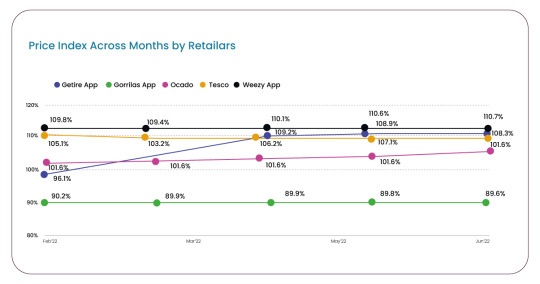
A wave of European and UK startups, including Jiffy, Dija, Weezy, Zapp, Getir, and Gorillas, entered the scene with a shared commitment: to provide the swiftest and most cost-effective grocery delivery services.
Our dataset uncovered intriguing discounting dynamics among these players. Gorillas maintained a discounting strategy in line with its competitors. Conversely, Getir appeared to adopt a more aggressive approach, veering towards deep discounting. Notably, Getir consistently offered the highest discounts throughout the observed period. In April, their discounts surged to nearly 9% more than those of Ocado—the runner-up in discounting.
As previously discussed, the period from February to June saw Getir securing price leadership. It's plausible that their strategy of deep discounting contributed to this accomplishment. In contrast, Gorillas opted for a different route, showcasing the lowest and almost negligible discounting practices.
Observing Price Index Trends Over Five Monthss
Our focus shifted towards analyzing Price Index (PI) trends among these five retailers, encompassing February to June 2022. It enabled us to gauge the fluctuations in alcohol prices over this period.
Please note: Retailers operating at the 100% mark indicated they were selling at an optimal price, refraining from undercutting the market. The pricing sweet spot rested between 95% and 105%. Deviating lower would potentially jeopardize profit margins while exceeding this range indicated that the retailer needed to position more competitively.
Price Index Insights: Retailers' Strategic Positioning
Among the retailers, Weezy displayed the most optimal Price Index, residing within the 100% to 102% range.
Conversely, Gorillas held the lowest Price Index, from 89% to 91%.
Getir, initially boasting a lower Price Index of 96.1% in February, progressively climbed to surpass 110% in April, May, and June.
Agility In Price Adjustments: Identifying Leaders
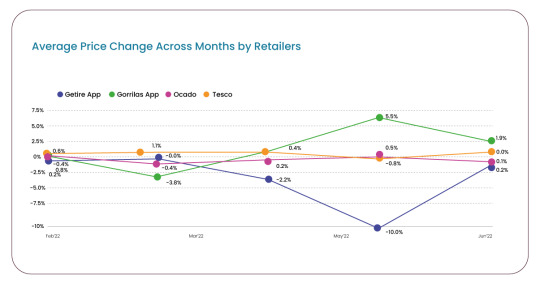
Stability In Pricing Trends Among Retailers
Predominantly, most retailers adhered to a consistent pricing trajectory using liquor product data scraping, maintaining a degree of competitive alignment. Their pricing approaches were relatively well-matched.
Yet, Gorillas stood out for implementing significant price adjustments in specific months. Notably, they enacted a notable reduction of 3.8% in prices in March. Subsequently, in May, Gorillas increased 5.5% in their pricing.
In that same eventful May, Weezy embarked on a distinctive strategy, considerably slashing prices by 10%. This move widened the gap between Gorillas and Weezy.
Preserving Sales Through Stock Availability Management
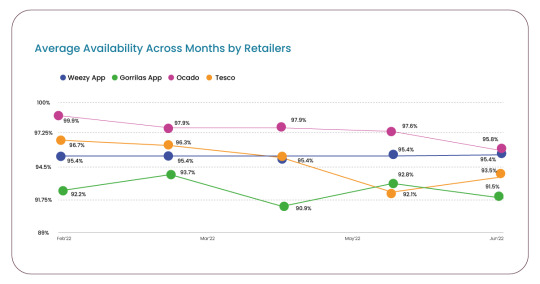
Diverse Stock Availability Among Retailers
Our data analysis unveiled distinct levels of stock availability across the retailers. Ocado, in particular, maintained the highest availability throughout the observed five months. At a robust 100%, their stock levels gradually receded, concluding at 95.8% by June.
Tesco, on the other hand, encountered a pronounced decline in availability during May and June. At 97%, availability dwindled to 92-93%.
Gorillas consistently exhibited the lowest stock availability, fluctuating between 90% and 94% across the months.
Weezy demonstrated steadfast consistency, upholding a consistent 95% availability throughout five months.
Concluding Insights
In the UK market, a favorable inclination towards online alcohol purchases is evident, predominantly catalyzed by shifts in consumer behavior prompted by the pandemic. According to the IWSR Drinks Market Analysis Report 2022, markets primarily driven by websites, like the UK, prioritize a wide product range and competitive pricing. Both these factors wield significant influence in purchase decisions. Conversely, consumers in app-centric markets hold distinct preferences. While price remains a consideration, it is less vital than convenience and speed.
Product Data Scrape is committed to upholding the utmost standards of ethical conduct across our Competitor Price Monitoring Services and Mobile App Data Scraping operations. With a global presence across multiple offices, we meet our customers' diverse needs with excellence and integrity.
#WebScrapingLiquorData#ScrapeUKAlcoholRetailIndustry#WebScrapingRetailWebsitesData#ScrapeUKRetailTrends#UKLiquorDataScraper#ScrapeLiquorData
0 notes
Text
Scrape Liquor Delivery Mobile App Data for Market Insights?
Mobile App Scraping offers Liquor Delivery Mobile App Data Scraping Services to extract data from popular Liquor Delivery Mobile Apps such as Swiggy, Hipbar, Zomato, Bottle Rover, Jhoom, BevQ, Living Liquidz, etc.
know more: https://mobileappscrapping13.blogspot.com/2023/09/how-to-scrape-liquor-delivery-mobile.html
#liquordeliveryappsDataScraping#liquordeliveryappsDataScraper#ScrapeliquordeliveryappsData#ExtractliquordeliveryappsData#liquordeliveryappsDataCollection
0 notes
Text

Know more >>
#Scrape Liquor Delivery App Data#Liquor Delivery App Data Scraping#Liquor Delivery App Data Scraper#Extract Liquor Delivery App Data#Liquor Delivery App Data Extraction
0 notes
Text
How to Scrape Liquor Delivery Mobile App Data for Market Insights?

How to Scrape Liquor Delivery Mobile App Data for Market Insights?
Aug 09, 2023
Mobile App Scraping is proud to offer cutting-edge Liquor Delivery Mobile App Data Scraping Services tailored to empower liquor delivery service providers with comprehensive insights and actionable intelligence. Our commitment to ethical data scraping practices ensures compliance with legal regulations and preserves the integrity of our information. Ready to harness the power of data to elevate your liquor delivery business? Contact Mobile App Scraping today and discover how our Liquor Delivery Mobile App Data Scraping Services can revolutionize your decision-making process, enhance customer satisfaction, and drive growth in the dynamic world of liquor delivery.
What Are The Main Sources Of Data For Liquor Delivery Mobile App Data Scraping?

The main sources of data for liquor delivery mobile app data scraping typically include:
Mobile App Interfaces: Liquor delivery mobile apps themselves serve as valuable sources of data. By scraping the user interfaces and screens of these apps, relevant information such as product listings, prices, descriptions, ratings, and reviews can be extracted.
Apps and APIs: Many liquor delivery apps have accompanying apps or provide APIs (Application Programming Interfaces) for data exchange. These platforms often contain additional data such as promotional offers, special deals, user profiles, and order histories.
Social Media Platforms: Social media platforms like Facebook, Twitter, and Instagram can provide supplementary data related to liquor delivery services. This may include user-generated content, brand interactions, customer feedback, and promotional campaigns.
Aggregator Platforms: Aggregator platforms that compile information from multiple liquor delivery apps can be a valuable source of data. These platforms aggregate data from various sources, allowing for broader data collection and comparison across different providers.
Publicly Available Data: Some data relevant to liquor delivery services, such as government regulations, licensing information, and industry reports, may be publicly available. Data scraping can help gather and consolidate this information for analysis and decision-making.
It's important to note that while data scraping can provide valuable insights, it should always be done in compliance with legal and ethical considerations, respecting the terms of service and privacy policies of the targeted platforms.
What Specific Information Can Be Extracted From Liquor Delivery Mobile Apps Through Mobile App Scraping’ Data Scraping?

Mobile App Scraping' Data Scraping Services for liquor delivery mobile apps can extract a wide range of specific information, including:
Product Listings: Our scraping techniques can gather details about the various liquor products available on the app, such as names, brands, types, descriptions, and packaging sizes.
Pricing Information: We can extract pricing details for liquor products, including regular prices, discounts, promotional offers, and bulk purchase options.
Availability and Stock Information: Our scraping services can provide real-time updates on product availability, ensuring accurate information on in-stock items and helping users make informed purchasing decisions.
Ratings and Reviews: We can collect user-generated ratings and reviews for liquor products, allowing businesses to gain insights into customer preferences, feedback, and overall satisfaction.
Delivery Options: Mobile App Scraping can extract information related to delivery options, including delivery fees, estimated delivery times, delivery areas, and any special conditions or requirements.
User Profiles: By scraping user profiles, we can gather data such as customer preferences, order histories, loyalty programs, and personal information (in compliance with privacy regulations).
Order Tracking: Our data scraping services can retrieve order tracking information, enabling users to monitor the progress of their liquor deliveries and stay updated on delivery status.
Promotional Offers and Discounts: Mobile App Scraping can extract details about ongoing promotions, exclusive discounts, limited-time offers, and loyalty programs available through the app.
Store Locations and Contact Information: We can gather data about physical store locations, contact details, operating hours, and other relevant information to facilitate customer inquiries or in-person visits.
Brand Information: Our scraping techniques can extract information about liquor brands, including their histories, origins, tasting notes, and any unique selling points associated with each brand.
Mobile App Scraping' data scraping services are tailored to meet your needs, ensuring accurate and comprehensive information extraction from liquor delivery mobile apps to drive data-driven decision-making, enhance customer experiences, and optimize business strategies.
How Can Data Scraping Techniques Be Applied To Gather Pricing Information From Different Liquor Delivery Apps?
Data scraping techniques can be effectively applied to gather pricing information from different liquor delivery apps by following these steps:
Identify Targeted Apps: Determine which liquor delivery apps to gather pricing information. Selecting a representative sample of apps that cover a range of brands, regions, and service providers is essential.
Understand App Structure: Analyze the structure and layout of the targeted apps to identify the specific elements that contain pricing information. This may include product pages, listings, search results, or dedicated pricing sections.
Develop Scraping Scripts: Utilize data scraping tools or custom-developed scripts to extract pricing data from the identified elements within the apps. These scripts can interact with the app's interface, simulate user actions, and retrieve the desired pricing information.
Handle Authentication: If the targeted apps require user authentication or login, ensure that your scraping scripts can handle the authentication process to access the pricing data. This may involve providing credentials or utilizing session management techniques.
Handle Dynamic Content: Some liquor delivery apps may employ dynamic content loading techniques, such as AJAX or JavaScript, to display pricing information. Ensure your scraping scripts can handle these dynamic elements to retrieve accurate pricing data.
Implement Data Extraction Logic: Define the data extraction logic within your scraping scripts to capture the relevant pricing information. This may involve extracting the product name, price, discounts, packaging sizes, and any additional details associated with the pricing.
Handle Pagination: If the app displays pricing information across multiple pages or uses pagination, implement mechanisms within your scraping scripts to navigate these pages and collect data from each page.
Validate and Clean Data: Once the pricing data is scraped, validate its accuracy and consistency. Perform data cleaning operations to remove irrelevant or erroneous information, ensuring the gathered pricing data is reliable and ready for analysis.
Store and Analyze Data: Store the scraped pricing data in a structured format like a database or spreadsheet. Utilize data analysis techniques to gain insights, compare prices across different apps, identify trends, and make informed pricing decisions.
By following these steps, data scraping techniques can effectively gather pricing information from different liquor delivery apps, enabling businesses to stay competitive, optimize pricing strategies, and provide accurate information to their customers.
What Tools And Technologies Are Commonly Used For Liquor Delivery Mobile App Data Scraping?
Several tools and technologies are commonly used for liquor delivery mobile app data scraping. Here are some of the popular ones:
Data Scraping Frameworks: Frameworks like BeautifulSoup (for Python) and Scrapy provide a structured approach to data scraping. They offer built-in functions and methods to extract data from HTML and XML structures, making scraping data from liquor delivery mobile apps more accessible.
Headless Browsers: Headless browsers like Puppeteer (for JavaScript) and Selenium (for multiple programming languages) allow automated browsing and interaction with data pages. They simulate user actions, such as clicking buttons or filling out forms, making them helpful in scraping data from dynamic and JavaScript-driven liquor delivery apps.
API Integration: Many liquor delivery apps provide APIs (Application Programming Interfaces) for data exchange. Tools like Postman, cURL, and Axios can send requests to these APIs, retrieve relevant data in a structured format (such as JSON), and process it for further analysis.
Proxy Servers: Proxy servers are commonly used in data scraping to mask IP addresses and avoid IP blocking or rate limiting. Tools like ProxyMesh, Scraper API, or rotating proxy services allow you to route your scraping requests through a pool of proxy servers, ensuring smooth and uninterrupted data extraction.
Data Parsing Libraries: JSON, XML, or CSV parsers help extract and parse structured data obtained from liquor delivery mobile apps. These libraries provide functions to manipulate and convert data into a readable format for analysis and storage.
Data Storage and Database Tools: To store and manage scraped data, tools like MySQL, PostgreSQL, MongoDB, or SQLite can be used. These databases enable efficient storage, querying, and retrieval of the scraped data for further analysis.
Cloud Services: Cloud-based platforms like AWS (Amazon Data Services) and GCP (Google Cloud Platform) offer scalable infrastructure for data scraping tasks. Services like AWS Lambda or Google Cloud Functions can be used to automate and schedule scraping scripts, ensuring efficient data extraction.

Data Cleaning and Analysis Tools: Pandas, NumPy, or R can clean, process, and analyze the scraped data. These libraries provide functions and statistical methods for data transformation, aggregation, and visualization.
When selecting tools and technologies for liquor delivery mobile app data scraping, consider factors such as the complexity of the app's structure, the desired level of automation, data processing requirements, and the scalability needed for large-scale scraping operations.
What Challenges Or Limitations Are Typically Encountered When Scraping Data From Liquor Delivery Mobile Apps?
Several challenges and limitations may arise when scraping data from liquor delivery mobile apps. Here are some common ones:

Dynamic and JavaScript-driven Content: Liquor delivery apps often use dynamic content loading techniques, such as AJAX or JavaScript, to display pricing, availability, or other information. Extracting data from dynamically rendered pages requires specialized tools or techniques like headless browsers to interact with the app and retrieve the desired data.
Rate Limiting and IP Blocking: Apps may have rate limits to prevent excessive scraping and protect their servers. Continuous and aggressive scraping without proper delays or IP rotation can lead to IP blocking or temporary bans, making it necessary to implement strategies to handle rate limiting and avoid detection.
App Updates and Changes: Liquor delivery apps undergo frequent updates, changes in design, or modifications to their data structures. These changes can break existing scraping scripts, requiring regular monitoring and adjustments to ensure the continued extraction of accurate data.
User Authentication and Login: Some apps require users to log in or authenticate their accounts to access specific data, such as personalized pricing or order history. Handling user authentication within scraping scripts can be complex and require additional steps or user credentials.
Data Quality and Integrity: Liquor delivery apps may contain inconsistent or incomplete data, leading to challenges in ensuring data quality and integrity during scraping. Handling missing or incorrect data and performing data cleaning operations are essential to maintain the reliability of the scraped information.
Legal and Ethical Considerations: Scraping data from liquor delivery mobile apps must be conducted within the boundaries of legal and ethical frameworks. The terms of service, privacy policies, and applicable regulations of the targeted apps must be respected to avoid legal repercussions and ensure ethical data collection practices.
Data Volume and Scalability: Liquor delivery apps can have a large volume of data, especially if scraping multiple apps or monitoring data over time. Managing and processing significant data efficiently may require robust infrastructure, scalable storage solutions, and optimized scraping strategies.
Localization and Multilingual Challenges: Liquor delivery apps catering to different regions or countries may present localization challenges, such as scraping data with multiple languages, currency conversions, or region-specific pricing structures. Handling these variations accurately can be complex and require additional language processing or localization techniques.
Data Consistency and Variability: Different liquor delivery apps may have variations in data presentation, naming conventions, or categorization of products. Ensuring consistent data extraction and mapping across multiple apps can be challenging and may require customized scraping logic or data normalization procedures.
Overcoming these challenges requires expertise in data scraping, adapting to changes, employing appropriate techniques, and implementing robust strategies to ensure accurate and reliable data extraction from liquor delivery mobile apps.
How Can Data Scraping From Mobile App Scraping Assist In Competitive Analysis For Liquor Delivery Service Providers?
Data scraping from Mobile App Scraping can provide valuable assistance in competitive analysis for liquor delivery service providers. Here's how:

Product Assortment Analysis: By scraping data on product listings and descriptions, you can gain an understanding of the assortment offered by your competitors. This information helps you identify gaps or areas where you can differentiate your offerings to attract customers.
Promotional Strategies: Mobile App Scraping' data scraping can gather details about promotional offers, discounts, and special deals run by your competitors. This allows you to evaluate their promotional strategies and devise compelling promotions to gain a competitive edge.
User Reviews and Ratings: Data scraping can collect user-generated reviews and ratings for liquor delivery services. Analyzing these reviews provides insights into the strengths and weaknesses of your competitors, helping you identify areas for improvement in your service.
Delivery Options and Speed: By scraping data on delivery options, estimated delivery times, and service coverage, you can evaluate the delivery capabilities of your competitors. This information helps you optimize your delivery processes to match or exceed customer expectations.
Customer Engagement: Data scraping can extract data on customer interactions and engagement with your competitors' apps or social media platforms. This insight allows you to assess their customer engagement strategies and refine your approaches to attract and retain customers.
Market Trends and Demand: Mobile App Scraping' data scraping can provide insights into market trends, such as popular liquor types, emerging brands, or changing customer preferences. By staying abreast of market dynamics, you can make data-driven decisions to align your offerings with current demand.
Competitive Positioning: By analyzing the data collected through scraping, you can better understand your position in the market compared to your competitors. This knowledge allows you to refine your brand positioning and develop strategies to differentiate yourself and stand out.
New Entrants and Market Expansion: Data scraping can help identify new players entering the market or existing competitors expanding their services. This information allows you to respond to market changes and adjust your strategies accordingly and proactively.
Strategic Decision Making: Overall, data scraping from Mobile App Scraping empowers you to make informed strategic decisions based on comprehensive insights into your competitive landscape. It enables you to identify opportunities, mitigate risks, and develop strategies to stay ahead in the dynamic liquor delivery industry.
By leveraging Mobile App Scraping' data scraping services, you can gain a competitive advantage, optimize your business strategies, and drive growth in the highly competitive liquor delivery market.
What Measures Can Be Implemented To Ensure The Accuracy And Reliability Of Scraped Data From Liquor Delivery Apps?
To ensure the accuracy and reliability of scraped data from liquor delivery apps, you can implement the following measures:
Data Validation and Cleaning: Perform data validation checks to identify and handle any inconsistencies or errors in the scraped data. Implement data cleaning techniques to remove irrelevant or duplicated information, standardize formats, and correct inaccuracies.
Error Handling and Exception Management: Develop error handling mechanisms within your scraping scripts to handle unexpected scenarios, such as connection errors, page load failures, or missing data. Implement exception management techniques to handle errors and ensure the scraping process continues smoothly and gracefully.
Robust Scraping Logic: Build robust scraping logic that can adapt to app structure or data presentation changes. Implement error-checking mechanisms to verify that the scraped data matches the expected format and structure, ensuring accuracy and reliability.
Regular Monitoring and Maintenance: Continuously monitor the scraping process to identify any issues or changes in the app's interface that may affect data scraping. Regularly update and maintain your scraping scripts to accommodate app updates, ensuring accurate and consistent data extraction over time.
User Feedback and Validation: Validate the accuracy of the scraped data by cross-referencing it with user feedback or other reliable sources. Incorporate user feedback and suggestions into your scraping process to improve data accuracy and address any identified discrepancies.
Test Scenarios and Quality Assurance: Conduct thorough testing of your scraping scripts and data extraction processes using test scenarios and representative data sets. This helps identify potential errors or issues affecting data accuracy and reliability.
Quality Control Checks: Implement quality control checks at various stages of the scraping process to ensure the accuracy and reliability of the extracted data. This may involve comparing the scraped data against known benchmarks or conducting random sampling checks to validate its integrity.
Source and Timestamp Tracking: Maintain a record of the source of the scraped data and the timestamp of each data extraction. This helps track the origin of the data and ensures you have the most up-to-date information for analysis and decision-making.
Compliance with Legal and Ethical Guidelines: Ensure that your data scraping activities comply with legal and ethical guidelines, respecting the terms of service, privacy policies, and intellectual property rights of the targeted liquor delivery apps. Adhere to data protection regulations and obtain necessary data collection and storage permissions.
Continuous Improvement: Refine and improve your scraping techniques based on feedback, lessons learned, and changing app structures. Regularly assess the accuracy and reliability of the scraped data and implement iterative improvements to enhance data quality over time.
By implementing these measures, you can enhance the accuracy and reliability of the scraped data from liquor delivery apps, enabling you to make informed decisions and derive valuable insights from the collected data.
What Are The Benefits Of Hiring Liquor Delivery Mobile App Data Scraping From Mobile App Scraping?

Hiring liquor delivery mobile app data scraping services from Mobile App Scraping offers several benefits. Here are some of the key advantages:
Comprehensive Data Extraction: Mobile App Scraping specializes in data scraping and has expertise in extracting data from liquor delivery mobile apps. They can efficiently gather a wide range of data points, including pricing information, product details, user reviews, promotions, and more, providing you with a comprehensive dataset for analysis.
Timely and Regular Updates: Mobile App Scraping can set up automated data scraping processes that run regularly, ensuring you receive timely and up-to-date information from liquor delivery apps. This lets you stay informed about real-time market trends, competitor strategies, and other relevant data.
Customized Scraping Solutions: Mobile App Scraping can tailor their data scraping services to meet your requirements. Whether you need data from specific liquor delivery apps, targeted regions, or customized data fields, they can design scraping solutions that align with your business needs.
Quality and Accuracy Assurance: Mobile App Scraping emphasizes data quality and accuracy. They employ robust validation and cleaning techniques to ensure the scraped data is reliable, consistent, and error-free. This enables you to use the scraped data for analysis and decision-making confidently.
Data Privacy and Security: Mobile App Scraping understands the importance of privacy and security. They implement measures to protect the confidentiality and integrity of the scraped data, ensuring compliance with applicable regulations and industry best practices.
Time and Cost Savings: You can save significant time and resources by outsourcing data scraping to Mobile App Scraping. Mobile App Scraping handles the technical complexities of scraping, including app structure analysis, script development, maintenance, and data processing, allowing you to focus on analyzing the extracted data and deriving insights.
Scalability and Flexibility: Mobile App Scraping can scale its scraping services to accommodate your evolving needs. Whether you require scraping from a few apps or many liquor delivery platforms, Mobile App Scraping can adapt its infrastructure and resources accordingly, ensuring a flexible and scalable solution.
Expertise and Technical Know-how: Mobile App Scraping has expertise in data scraping, including handling dynamic content, overcoming scraping challenges, and adapting to changes in app structures. Their technical know-how and experience in data extraction enable them to efficiently and effectively gather data from liquor delivery mobile apps.
Competitive Advantage: By leveraging Mobile App Scraping' data scraping services, you gain a competitive advantage in the liquor delivery market. The insights derived from the scraped data can inform your pricing strategies, product assortment, promotions, and overall business decisions, helping you stay ahead of the competition.
Focus on Core Competencies: Outsourcing data scraping to Mobile App Scraping allows you to focus on your core competencies and business operations. By relying on their expertise in data scraping, you can streamline your processes, enhance efficiency, and allocate resources to areas that drive growth and value.
Hiring liquor delivery mobile app data scraping services from Mobile App Scraping empowers you with accurate, timely, and actionable data, enabling you to make informed decisions, improve your competitive positioning, and drive business success in the liquor delivery industry.
Mobile App Scraping offers reliable and efficient liquor delivery mobile app data scraping services that provide valuable insights for businesses in the liquor delivery industry. With their expertise in data scraping, Mobile App Scraping can extract comprehensive data, including pricing information, product details, promotions, user reviews, and more. Their commitment to data quality, accuracy, and timely updates ensures that clients receive reliable, up-to-date information for competitive analysis and informed decision-making. By partnering with Mobile App Scraping, businesses can save time and resources and gain a competitive advantage in the market. Take advantage of the opportunity to leverage the power of data scraping from liquor delivery mobile apps. Contact Mobile App Scraping today to unlock valuable insights and drive your business growth in the dynamic liquor delivery industry.:
Know more >>
#Scrape Liquor Delivery App Data#Liquor Delivery App Data Scraping#Liquor Delivery App Data Scraper#Extract Liquor Delivery App Data#Liquor Delivery App Data Extraction
0 notes
Text
Empower the Surge of Online Alcohol Retail in the UK by Web Scraping Liquor Data
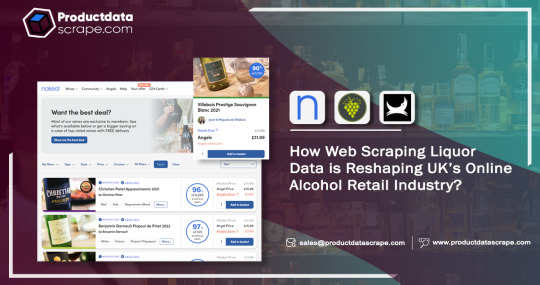
The Alcohol eCommerce sector has experienced rapid expansion, a trend accentuated by the pandemic. Post-pandemic, factors like convenience, safety, and home delivery gained prominence, propelling alcohol sales through eCommerce. In the UK, Kantar noted a £261 million surge in rising sales, with online and convenience stores emerging as the key beneficiaries. Intriguingly, the IWSR Drinks Market Analysis Report 2022 highlighted a global preference for websites over apps when purchasing alcohol online, except in China and Brazil. Notably, in the UK, major online alcohol purchases occur via retailer websites, not apps.
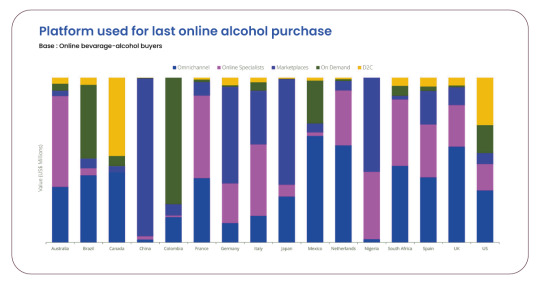
Research Approach
Our research was conducted through liqour data scraping, spanning February 2022 to June 2022. The focus of our study encompassed two prominent grocery retailers, namely Tesco and Ocado, along with three noteworthy grocery apps, namely Gorillas, Weezy, and Getir. The specific category under scrutiny throughout our analysis was alcohol.
Identifying The Alcohol Price Leader
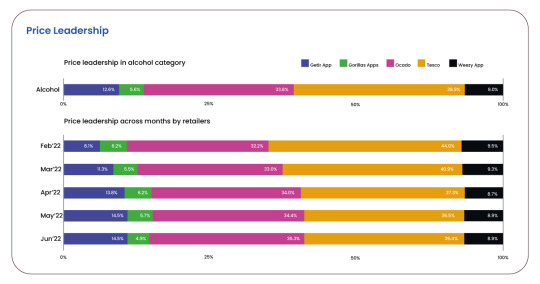
Tesco's Leadership In Alcohol Pricing
Throughout February to June 2022, Tesco consistently established itself as the front-runner in price leadership within the Alcohol category. Leveraging e-commerce data scraping, Tesco secured the lowest prices for 38.9% of its products. Ocado followed closely with 33.8%, while Gorillas exhibited the most minor dominance, leading in price for only 5.6% of its alcohol offerings.
Nonetheless, Tesco's grip on price leadership experienced a gradual erosion over the months. Commencing in February,e-commerce data scraping revealed Tesco's hold on the lowest price for 44% of its products, which tapered to just over 36% by June. Conversely, Ocado depicted an inverse trajectory—starting at a 32% price leadership in February, climbing to 35.3% by June.
An intriguing contender, illuminated through e-commerce data scraping, was Getir. Commencing with a modest 8.2% price leadership for its products in February, Getir's proportion progressively expanded, culminating at 14.5% in June.
Retailers Employing Discounts To Bolster Alcohol Sales
Leveraging discounts using liquor product data collection proves to be an effective strategy to attract consumers impacted by inflation. Through loyalty card discounts, reward vouchers, and various promotional tactics, retailers enhance the allure of their products, rendering them more competitive and appealing to customers. Maintaining competitiveness necessitates retailers' awareness of their rivals' discount offerings. Moreover, price monitoring helps comprehend the potential ramifications of substantial discounting and its influence on profit margins.

A wave of European and UK startups, including Jiffy, Dija, Weezy, Zapp, Getir, and Gorillas, entered the scene with a shared commitment: to provide the swiftest and most cost-effective grocery delivery services.
Our dataset uncovered intriguing discounting dynamics among these players. Gorillas maintained a discounting strategy in line with its competitors. Conversely, Getir appeared to adopt a more aggressive approach, veering towards deep discounting. Notably, Getir consistently offered the highest discounts throughout the observed period. In April, their discounts surged to nearly 9% more than those of Ocado—the runner-up in discounting.
As previously discussed, the period from February to June saw Getir securing price leadership. It's plausible that their strategy of deep discounting contributed to this accomplishment. In contrast, Gorillas opted for a different route, showcasing the lowest and almost negligible discounting practices.
Observing Price Index Trends Over Five Monthss
Our focus shifted towards analyzing Price Index (PI) trends among these five retailers, encompassing February to June 2022. It enabled us to gauge the fluctuations in alcohol prices over this period.
Please note: Retailers operating at the 100% mark indicated they were selling at an optimal price, refraining from undercutting the market. The pricing sweet spot rested between 95% and 105%. Deviating lower would potentially jeopardize profit margins while exceeding this range indicated that the retailer needed to position more competitively.
Price Index Insights: Retailers' Strategic Positioning
Among the retailers, Weezy displayed the most optimal Price Index, residing within the 100% to 102% range.
Conversely, Gorillas held the lowest Price Index, from 89% to 91%.
Getir, initially boasting a lower Price Index of 96.1% in February, progressively climbed to surpass 110% in April, May, and June.
Agility In Price Adjustments: Identifying Leaders
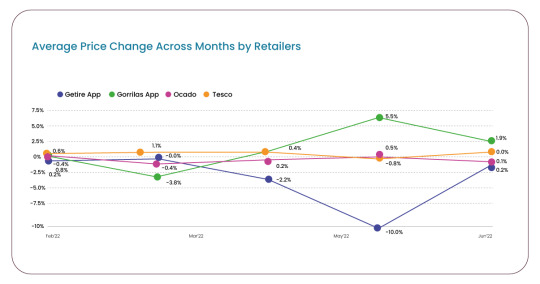
Stability In Pricing Trends Among Retailers
Predominantly, most retailers adhered to a consistent pricing trajectory using liquor product data scraping, maintaining a degree of competitive alignment. Their pricing approaches were relatively well-matched.
Yet, Gorillas stood out for implementing significant price adjustments in specific months. Notably, they enacted a notable reduction of 3.8% in prices in March. Subsequently, in May, Gorillas increased 5.5% in their pricing.
In that same eventful May, Weezy embarked on a distinctive strategy, considerably slashing prices by 10%. This move widened the gap between Gorillas and Weezy.
Preserving Sales Through Stock Availability Management
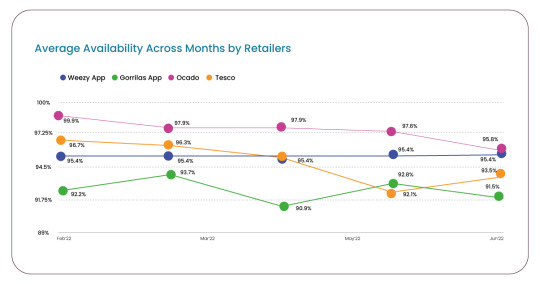
Diverse Stock Availability Among Retailers
Our data analysis unveiled distinct levels of stock availability across the retailers. Ocado, in particular, maintained the highest availability throughout the observed five months. At a robust 100%, their stock levels gradually receded, concluding at 95.8% by June.
Tesco, on the other hand, encountered a pronounced decline in availability during May and June. At 97%, availability dwindled to 92-93%.
Gorillas consistently exhibited the lowest stock availability, fluctuating between 90% and 94% across the months.
Weezy demonstrated steadfast consistency, upholding a consistent 95% availability throughout five months.
Concluding Insights
In the UK market, a favorable inclination towards online alcohol purchases is evident, predominantly catalyzed by shifts in consumer behavior prompted by the pandemic. According to the IWSR Drinks Market Analysis Report 2022, markets primarily driven by websites, like the UK, prioritize a wide product range and competitive pricing. Both these factors wield significant influence in purchase decisions. Conversely, consumers in app-centric markets hold distinct preferences. While price remains a consideration, it is less vital than convenience and speed.
Product Data Scrape is committed to upholding the utmost standards of ethical conduct across our Competitor Price Monitoring Services and Mobile App Data Scraping operations. With a global presence across multiple offices, we meet our customers' diverse needs with excellence and integrity.
#WebScrapingLiquorData#UKAlcoholRetailDataScraping#OnlineAlcoholRetailScraper#LiquorDataScrapingService#ScrapeLiquorData#LiquorDatacollection
0 notes
Text
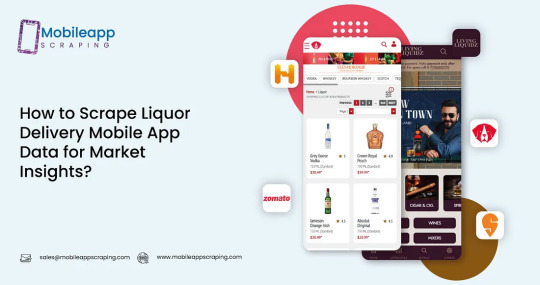
Mobile App Scraping offers Liquor Delivery Mobile App Data Scraping Services to extract data from popular Liquor Delivery Mobile Apps such as Swiggy, Hipbar, Zomato, Bottle Rover, Jhoom, BevQ, Living Liquidz, etc. Liquor Delivery Mobile App Data Scraping Services tailored to empower liquor delivery service providers with comprehensive insights and actionable intelligence.
know more: https://medium.com/@mobileappscraping/how-to-scrape-liquor-delivery-mobile-app-data-for-market-insights-5384ffab25b3
#liquordeliveryappsDataScraping#liquordeliveryappsDataScraper#ScrapeliquordeliveryappsData#ExtractliquordeliveryappsData#liquordeliveryappsDataCollection
1 note
·
View note